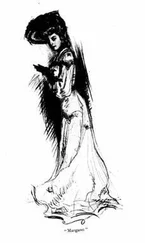James Cabell - Domnei. A Comedy of Woman-Worship
Здесь есть возможность читать онлайн «James Cabell - Domnei. A Comedy of Woman-Worship» весь текст электронной книги совершенно бесплатно (целиком полную версию без сокращений). В некоторых случаях можно слушать аудио, скачать через торрент в формате fb2 и присутствует краткое содержание. Жанр: Фэнтези, на английском языке. Описание произведения, (предисловие) а так же отзывы посетителей доступны на портале библиотеки ЛибКат.
- Название:Domnei. A Comedy of Woman-Worship
- Автор:
- Жанр:
- Год:неизвестен
- ISBN:нет данных
- Рейтинг книги:5 / 5. Голосов: 1
-
Избранное:Добавить в избранное
- Отзывы:
-
Ваша оценка:
- 100
- 1
- 2
- 3
- 4
- 5
Domnei. A Comedy of Woman-Worship: краткое содержание, описание и аннотация
Предлагаем к чтению аннотацию, описание, краткое содержание или предисловие (зависит от того, что написал сам автор книги «Domnei. A Comedy of Woman-Worship»). Если вы не нашли необходимую информацию о книге — напишите в комментариях, мы постараемся отыскать её.
Domnei. A Comedy of Woman-Worship — читать онлайн бесплатно полную книгу (весь текст) целиком
Ниже представлен текст книги, разбитый по страницам. Система сохранения места последней прочитанной страницы, позволяет с удобством читать онлайн бесплатно книгу «Domnei. A Comedy of Woman-Worship», без необходимости каждый раз заново искать на чём Вы остановились. Поставьте закладку, и сможете в любой момент перейти на страницу, на которой закончили чтение.
Интервал:
Закладка:
Domnei
A Comedy of Woman-Worship
By
JAMES BRANCH CABELL
"En cor gentil domnei per mort no passa."
TO
SARAH READ McADAMS
IN GRATITUDE AND AFFECTION
A Preface
By
Joseph Hergesheimer
It would be absorbing to discover the present feminine attitude toward the profoundest compliment ever paid women by the heart and mind of men in league—the worshipping devotion conceived by Plato and elevated to a living faith in mediaeval France. Through that renaissance of a sublimated passion domnei was regarded as a throne of alabaster by the chosen figures of its service: Melicent, at Bellegarde, waiting for her marriage with King Theodoret, held close an image of Perion made of substance that time was powerless to destroy; and which, in a life of singular violence, where blood hung scarlet before men's eyes like a tapestry, burned in a silver flame untroubled by the fate of her body. It was, to her, a magic that kept her inviolable, perpetually, in spite of marauding fingers, a rose in the blanched perfection of its early flowering.
The clearest possible case for that religion was that it transmuted the individual subject of its adoration into the deathless splendor of a Madonna unique and yet divisible in a mirage of earthly loveliness. It was heaven come to Aquitaine, to the Courts of Love, in shapes of vivid fragrant beauty, with delectable hair lying gold on white samite worked in borders of blue petals. It chose not abstractions for its faith, but the most desirable of all actual—yes, worldly—incentives: the sister, it might be, of Count Emmerick of Poictesme. And, approaching beatitude not so much through a symbol of agony as by the fragile grace of a woman, raising Melicent to the stars, it fused, more completely than in any other aspiration, the spirit and the flesh.
However, in its contact, its lovers' delight, it was no more than a slow clasping and unclasping of the hands; the spirit and flesh, merged, became spiritual; the height of stars was not a figment…. Here, since the conception of domnei has so utterly vanished, the break between the ages impassable, the sympathy born of understanding is interrupted. Hardly a woman, to-day, would value a sigh the passion which turned a man steadfastly away that he might be with her forever beyond the parched forest of death. Now such emotion is held strictly to the gains, the accountability, of life's immediate span; women have left their cloudy magnificence for a footing on earth; but—at least in warm graceful youth—their dreams are still of a Perion de la Forêt. These, clear-eyed, they disavow; yet their secret desire, the most Elysian of all hopes, to burn at once with the body and the soul, mocks what they find.
That vision, dominating Mr. Cabell's pages, the record of his revealed idealism, brings specially to Domnei a beauty finely escaping the dusty confusion of any present. It is a book laid in a purity, a serenity, of space above the vapors, the bigotry and engendered spite, of dogma and creed. True to yesterday, it will be faithful of to-morrow; for, in the evolution of humanity, not necessarily the turn of a wheel upward, certain qualities have remained at the center, undisturbed. And, of these, none is more fixed than an abstract love.
Different in men than in women, it is, for the former, an instinct, a need, to serve rather than be served: their desire is for a shining image superior, at best, to both lust and maternity. This consciousness, grown so dim that it is scarcely perceptible, yet still alive, is not extinguished with youth, but lingers hopeless of satisfaction through the incongruous years of middle age. There is never a man, gifted to any degree with imagination, but eternally searches for an ultimate loveliness not disappearing in the circle of his embrace—the instinctively Platonic gesture toward the only immortality conceivable in terms of ecstasy.
A truth, now, in very low esteem! With the solidification of society, of property, the bond of family has been tremendously exalted, the mere fact of parenthood declared the last sanctity. Together with this, naturally, the persistent errantry of men, so vulgarly misunderstood, has become only a reprehensible paradox. The entire shelf of James Branch Cabell's books, dedicated to an unquenchable masculine idealism, has, as well, a paradoxical place in an age of material sentimentality. Compared with the novels of the moment, Domnei is an isolated, a heroic fragment of a vastly deeper and higher structure. And, of its many aspects, it is not impossible that the highest, rising over even its heavenly vision, is the rare, the simple, fortitude of its statement.
Whatever dissent the philosophy of Perion and Melicent may breed, no one can fail to admire the steady courage with which it is upheld. Aside from its special preoccupation, such independence in the face of ponderable threat, such accepted isolation, has a rare stability in a world treacherous with mental quicksands and evasions. This is a valor not drawn from insensibility, but from the sharpest possible recognition of all the evil and Cyclopean forces in existence, and a deliberate engagement of them on their own ground. Nothing more, in that direction, can be asked of Mr. Cabell, of anyone. While about the story itself, the soul of Melicent, the form and incidental writing, it is no longer necessary to speak.
The pages have the rich sparkle of a past like stained glass called to life: the Confraternity of St. Médard presenting their masque of Hercules; the claret colored walls adorned with gold cinquefoils of Demetrios' court; his pavilion with porticoes of Andalusian copper; Theodoret's capital, Megaris, ruddy with bonfires; the free port of Narenta with its sails spread for the land of pagans; the lichen-incrusted glade in the Forest of Columbiers; gardens with the walks sprinkled with crocus and vermilion and powdered mica … all are at once real and bright with unreality, rayed with the splendor of an antiquity built from webs and films of imagined wonder. The past is, at its moment, the present, and that lost is valueless. Distilled by time, only an imperishable romantic conception remains; a vision, where it is significant, animated by the feelings, the men and women, which only, at heart, are changeless.
They, the surcharged figures of Domnei , move vividly through their stone galleries and closes, in procession, and—a far more difficult accomplishment—alone. The lute of the Bishop of Montors, playing as he rides in scarlet, sounds its Provençal refrain; the old man Theodoret, a king, sits shabbily between a prie-dieu and the tarnished hangings of his bed; Mélusine, with the pale frosty hair of a child, spins the melancholy of departed passion; Ahasuerus the Jew buys Melicent for a hundred and two minae and enters her room past midnight for his act of abnegation. And at the end, looking, perhaps, for a mortal woman, Perion finds, in a flesh not unscarred by years, the rose beyond destruction, the high silver flame of immortal happiness.
So much, then, everything in the inner questioning of beings condemned to a glimpse of remote perfection, as though the sky had opened on a city of pure bliss, transpires in Domnei ; while the fact that it is laid in Poictesme sharpens the thrust of its illusion. It is by that much the easier of entry; it borders—rather than on the clamor of mills—on the reaches men explore, leaving' weariness and dejection for fancy—a geography for lonely sensibilities betrayed by chance into the blind traps, the issueless barrens, of existence.
JOSEPH HERGESHEIMER.
And Norman Nicolas at hearté meant
(Pardie!) some subtle occupation
In making of his Tale of Melicent,
That stubbornly desiréd Perion.
What perils for to rollen up and down,
So long process, so many a sly cautel,
For to obtain a silly damosel!
Интервал:
Закладка:
Похожие книги на «Domnei. A Comedy of Woman-Worship»
Представляем Вашему вниманию похожие книги на «Domnei. A Comedy of Woman-Worship» списком для выбора. Мы отобрали схожую по названию и смыслу литературу в надежде предоставить читателям больше вариантов отыскать новые, интересные, ещё непрочитанные произведения.
Обсуждение, отзывы о книге «Domnei. A Comedy of Woman-Worship» и просто собственные мнения читателей. Оставьте ваши комментарии, напишите, что Вы думаете о произведении, его смысле или главных героях. Укажите что конкретно понравилось, а что нет, и почему Вы так считаете.



